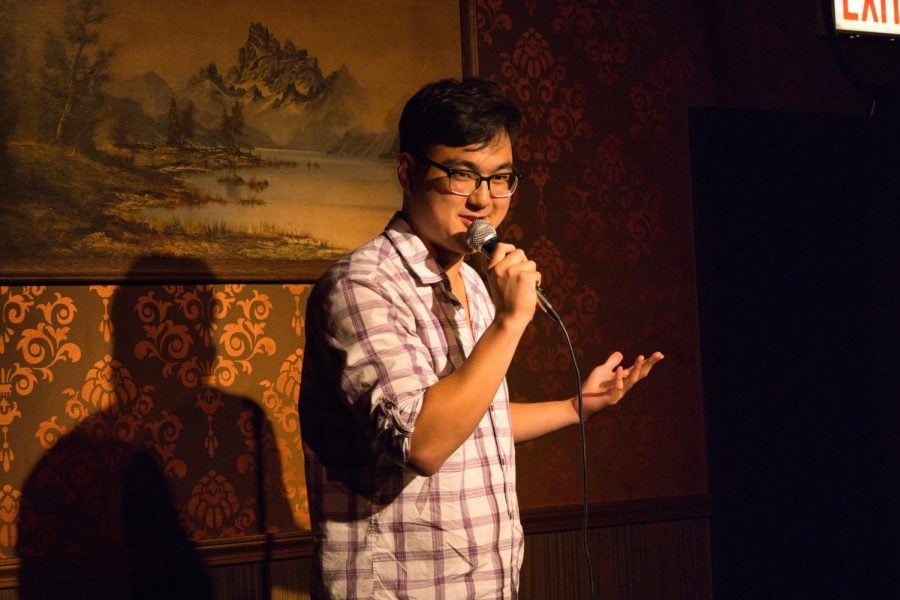Chicago comedian and Northwestern alum William Paik to study Korean stand-up on Fulbright grant
Photo courtesy of William Paik
Using a Fulbright grant, William Paik (Weinberg ’20) will take his passion for stand-up comedy from Chicago to South Korea for 10 months.
July 22, 2022
It has only been three years since William Paik (Weinberg ’20) performed his first set as a stand-up comedian in Chicago.
Come September, he’ll spend 10 months exploring stand-up comedy on the other side of the world in South Korea, where he aims to interview comedians about their experience in addition to performing showcases and open mics.
This year, Paik was among the 20% of applicants for the Fulbright U.S. Student Program awarded a research grant. The organization seeks to expand cross-cultural perspectives through academic and professional development.
Given the relatively new concept of stand-up in South Korea, Paik said he was interested in how audiences grapple with the unfamiliar. As an Asian American, he also wondered if speaking from his experience would be able to translate through humor cross-culturally.
“Will they understand or feel it similarly?” Paik said. “Or will they be like, ‘I get why that’s funny, but I don’t feel it being funny?’”
Creating bits from his experience growing up Asian American hasn’t been new for Paik, who currently produces an Asian American comedy show called “East of California West of New York” at the Lincoln Lodge in Chicago.
John Leadley, co-runner of the Lincoln Lodge, said he believes humor can translate to a certain extent despite limitations. He recalled performances from South American and Russian comedians at the venue.
“The language barrier exists, but with the way the cadence and the way things are delivered, you still kind of know where the joke’s at,” Leadley said. “Hearing someone’s rhythm, even in a different language — it kind of resonates if you’re a comedian or have done comedy.”
Beyond translation, Paik said he was also interested in stand-up comedy as a novel genre in South Korea because of its ability to deal with taboo subjects.
He emphasized South Korea’s larger consequences on speech from a political and social standpoint. Since the emergence of stand-up, he said, some comedians have used it to tackle topics like unpopular politicians or sex.
History and Asian American studies Prof. Ji-Yeon Yuh said stand-up comedy should receive more attention in the academic world for its role in social discourse.
Yuh, who recommended Paik for the Fulbright scholarship and worked with him for years, said he can fill the gap she has noticed in the lack of Asian American comedians. A valuable component of Paik’s stand-up is his ability to use his knowledge and background to critique the U.S., Yuh said.
As for Paik’s extended time in Korea, he said he was least worried about communicating in Korean and most worried about adjusting to unwritten rules, both in the stand-up community and in Korean society.
Yuh said the long history of comedy in classic works of Korean literature and opera will be fascinating for Paik to study.
“This time will be really important for his development both as a stand-up comedian and as a scholar of comedy and public discourse, but also a really interesting time for Koreans to be exposed to the kind of contemporary Korean American comedy that Will does,” Yuh said.
Paik said academia and stand-up intersect in how they are mostly individualized and can breed a level of insecurity and competition. Still, he said, the experience of performing and making audiences laugh has been rewarding.
Performing in Korea will be an opportunity for him to creatively start over, Paik said.
“The performing itself is amazing,” Paik said. “You definitely have to be very, very down for it, but I was. Seeing people come out who I would like to make laugh and speak to — it’s very exhilarating. Even on the bad nights, you can still enjoy yourself.”
Email: jennawang2024@u.northwestern.edu
Twitter: @jennajwang
Related Stories:
— “East of California West of New York” features Midwestern, Asian American stand-up comedians
— Cooper Raiff talks comedy, writing and new film ‘Cha Cha Real Smooth’
— ODB makes a multicultural comedy spring comeback with ‘ODBoots With the Fur’



